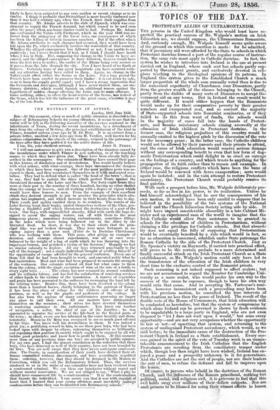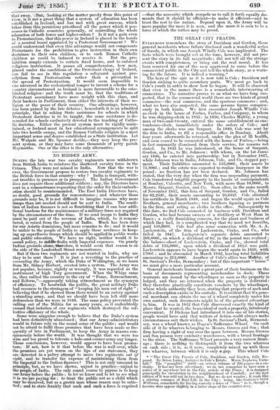TOPICS OF THE DAY.
PROTESTANT A TJJF.S. OF ULTRAMONTANISM.
TICE persons in the United Kingdom who would least have re- retted the practical success of Mr. Walpole's motion on Irish Education are, we should suppose, the Ultramontane Romanists. And, curiously enough, Mr. "Walpole himself seems quite aware of the ground on which this assertion is made : for he admitted, that if pecuniary aid were afforded by the State to schools in Which Protestant doctrine formed a part of the regular course of instruc- tion, 'the same rule must apply to Catholic doctrine. In fact, the system he wishes to introduce into Ireland is the one at present carried out in England, where each sect has schools partly sup- ported. by Government grants, and exclusively devoted in reli- gious teaching to the theological opinions of its patrons. In England this system gives to the Established Church a much larger proportion of the whole sum annually voted than is due to the numerical superiority of Churchmen over Dissenters, partly from the greater wealth of the classes belonging to the &lira, partly from the dislike of many sects of Dissenters to accept Go- vernment aid on any terms. But in Ireland the result would be quite different. It would either happen that the Romanists would make up for their comparative poverty by their greater numbers and exasperated zeal, and so convert the majority of-State-supported schools into Romanist seminaries, or if they failed to do this from want of funds, the schools would in the majority of cases fall into the hands of Protest- ants, and become missionary schools aiming avowedly at the education of Irish children in Protestant doctrine. In the former case, the religious prejudices of this 'country would be annually excited to the highest pitch by the discussion of the vote for the necessary grant ; in the latter case, the Catholic children would. not be allowed by their parents and their priests to attend, and the cause of Irish education would receive serious damage without any corresponding benefit to even that low form of dog- matic Protestantism which could delight in so cruel an outrage on the feelings of a country, and which trusts to anything for the propagation of its faith rather than to reason and example. In either case, the religious conflicts which have been the bane of Ireland would be renewed with fierce exasperation ; sects would again be isolated ; and in the vain attempt to restore Protestant ascendancy, the Protestant Church would probably receive its final qiiietus. With such a prospect before him, Mr. Walpole deliberately pro- ceeds; as far as lies in his power, to its realization. Unless he had himself acknowledged that he saw the consequences of his own motion, it would acknowledged been only candid to suppose that he believed in the possibility of the two systems of the National Board anaithe Church Education Society acting side by side. It might have agued considerable absurdity in a late Cabinet Mi- nister and an etperienced man of the world to imagine that the Irish Catholic would allow State assistance to be granted to schools for the education of children in Protestantism, without claiming a like privilege for Catholic schools. But that absurd- ity does not equal the folly of supposing that Protestantism would be eventually benefited by a rule which would in fact, so far as education is concerned, establish under State patronage the Roman Catholic by the side of the Protestant Church. Just as Mr. Spooner's victory onMaynooth, if carried into practical effect, will prove to be the certain prelude to a more determined and finally successful attack on the Irish Protestant Church as a State establishment, so Mr. Walpole's motion could only have led to the transference of the education of the Irish children in very short time to the exclusive control of the Romanist priests.
Such reasoning is not indeed supposed to affect zealots ; but we are not accustomed to regard the Member for Cambridge Uni- versity as a mere zealot, who would prefer his own way to the success of the cause he espouses, though to have his own way would ruin that cause. And in accepting Mr. Fortesoue's reso- lution, however inconsistent such a proceeding may have been with his previous motion, he consulted the true interests of Protestantism no less than the peace of Ireland. The result of the double vote of the House of Commons is, that Irish education will be conducted as heretofore, but that the system of compromise by which alone Ireland can be governed is shown by fresh evidence to be unpalatable to a large party in England, who are not even disposed to " let I dare not wait upon I would," but seize every opportunity—and are not very scrupulous whether the opportunity be fair or not—of upsetting that system, and returning to the system of undisguised Protestant ascendancy, which would, as we said before, be the immediate cause of the destruction of the Pro- testant Church in Ireland as a State establishment. Every suc- cess gained in the spirit of the vote of Tuesday week is an unmis- takeable announcement to the Irish Catholics that the English Protestants are receding from the conciliatory temper under which, though less than might have been wished, Ireland has en- joyed a peace and a prosperity unknown to it for generations. And the Catholics are not the sort of people, nor are their leaders the sort of men, to refuse the defiance and fail to improve upon the lesson.
Of course, to persons who behold in the doctrines of the Roman Church, and the influence of the Roman priesthood, nothing but political, social, and religious evil, it is grievous to feel that this millions evil holds sway over i ens of their-fellow subjects. Nor are such persons to be blamed for using their utmost efforts to loosen•
that sway. 13nt, looking at the matter purely from this point of view, is it not a great thing that a system of education has been established in Ireland, and has met with great success, which takes from this pernicious priesthood all the power which it pos- sesses in Catholic countries generally, of controlling the whole education of both lower and higher orders ? Is it not a gain even to Protestantism, that this power in Ireland is placed in the hands of a neutral board appointed by a Protestant Government ? We could understand that even this advantage would not compensate Protestants for the prohibition to give instruction in their own doctrines to their own children, or to such Roman Catholic
children as could be induced to receive it. But the pro- hibition simply extends to certain fixed hours, and to enforced religious instruction. It passes all comprehension, how men, placed under the conditions of the Protestant clergy of Ireland, can fail to see in this regulation a safeguard against pro- selytism from Protestantism rather than a prevention to the spread of Protestantism. It would seem impossible to
• one unversed in the ecclesiastical temper to invent a scheme for a country circumstanced as Ireland is more favourable to the esta- blished religion : and the truth must be, that the traditions of Protestant ascendancy have more weight with this class, and their backers in Parliament, than either the interests of their re- ligion or the peace of their country. One advantage, however, has been gained by the late debates ; henceforth it is an admitted principle, that in asking State assistance for schools in which Protestant doctrine is to be taught, the same assistance is de- manded for schools exclusively devoted to the teaching of Catho- lie doctrine. Either the present system must be rigidly main- tained, or Ireland must in her educational arrangements be split into two hostile camps, and the Roman Catholic religion in a most important sense and degree established as a State institution. Let Mr. Walpole and Mr. Spooner decide,—they may keep the pre- sent system, or they may have some thousands of petty parish Maynooths. One or the other is the only alternative.



























 Previous page
Previous page